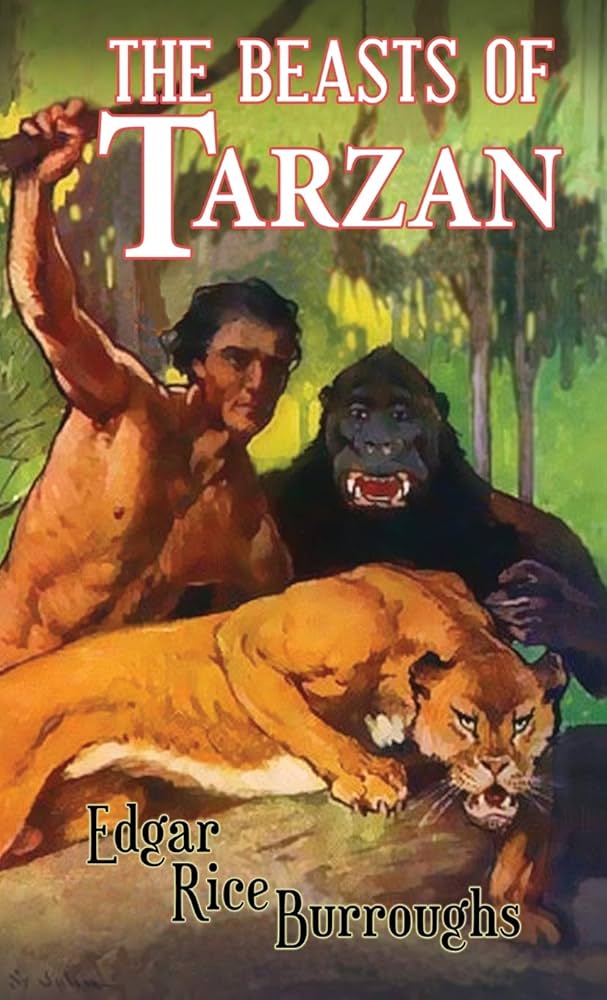Chapter 16 — The beasts of Tarzan
byChapter 16 — The beasts of Tarzan opens with Tarzan facing a deadly encounter beneath the murky waters of an African river. Caught in the crushing grip of a massive crocodile, he fights with every ounce of strength, refusing to yield even as the creature’s teeth clamp tighter. The beast drags him toward its lair, but Tarzan, though injured and gasping, uses his blade with precise desperation. His aim is not reckless but honed by instinct and survival. When the knife finds a vulnerable spot near the jaw, the crocodile thrashes violently before going still. The threat neutralized, Tarzan is left disoriented in a subterranean pocket beneath the riverbank, surrounded by silence and stifled air. With no time to dwell on pain or panic, he focuses on escape, crawling through a narrow, water-logged tunnel toward what he hopes is freedom and light.
Emerging from the tunnel scratched and bleeding, Tarzan finds himself once more in the heart of the jungle. Though weakened, he presses forward, driven not by pride but by the image of Jane in danger. Each step is agony, but he refuses to let injury slow his pace, fueled by the thought of his family lost or worse. Misled into believing Jane and their child are dead, his grief becomes fuel for vengeance. Trees blur past as he pushes through dense foliage, his every movement a blend of instinct and relentless determination. Hunger gnaws at him, and his body burns from the struggle, but he continues without hesitation. Along the way, wild animals cross his path, and though they sense his presence, none dare challenge the wounded man who moves with such violent intent.
Elsewhere, on the drifting ship Kincaid, Jane Clayton navigates her own survival. Though unarmed and surrounded by men who have long since cast honor aside, she refuses to become a victim. She engineers a clever ploy, setting the vessel adrift during the night, hoping to create chaos among her captors and improve her chances of escape. Her plan, however, misfires when the Kincaid runs aground near an unfamiliar shore, stranding everyone and resetting the stakes. Despite this setback, Jane’s courage does not falter. She understands the dangers ahead but chooses action over fear, preparing herself for whatever may come. In doing so, she proves that bravery is not reserved for warriors alone.
Tarzan’s journey eventually leads him to the coastline, where the sounds of panic and shouting seize his attention. A single scream cuts through the air—a sound he knows instantly. Though his body protests, he hurls himself forward, climbing through branches and over boulders with the fury of a father and husband who has waited too long to act. Gunfire follows, igniting his rage and sharpening his focus. His injuries are forgotten in that moment, replaced by a primal urge to protect. When he finally arrives, the scene before him is one of betrayal, violence, and chaos. Yet Tarzan doesn’t hesitate. His arrival is not a rescue—it is a reckoning.
Jane, though trapped, maintains her composure even as the sailors she once relied upon begin to turn on her. Their fear of Rokoff outweighs any sense of decency they might possess. She stands defiant, unwilling to beg, her spirit unbroken even as danger closes in. It’s this unyielding strength that Tarzan sees when he crashes onto the scene, and it steels his resolve. What follows is not a simple fight—it is a war of justice, with Tarzan unleashing both his fury and his cunning against those who dared threaten his family.
This chapter explores more than just physical survival; it delves into emotional endurance, the instincts born from love, and the determination to reclaim what has been stolen. Tarzan, torn between man and beast, reveals the fusion of intellect and savagery that defines his power. Jane, graceful and intelligent, demonstrates her own brand of strength that mirrors her husband’s resolve. Together, though separated, they represent a force that cannot be subdued by fear, betrayal, or cruelty. The wilderness around them is merciless, but it is also where their true selves flourish. Their story in this chapter doesn’t just move forward—it evolves, deepening their bond and setting the tone for the battles still to come.

